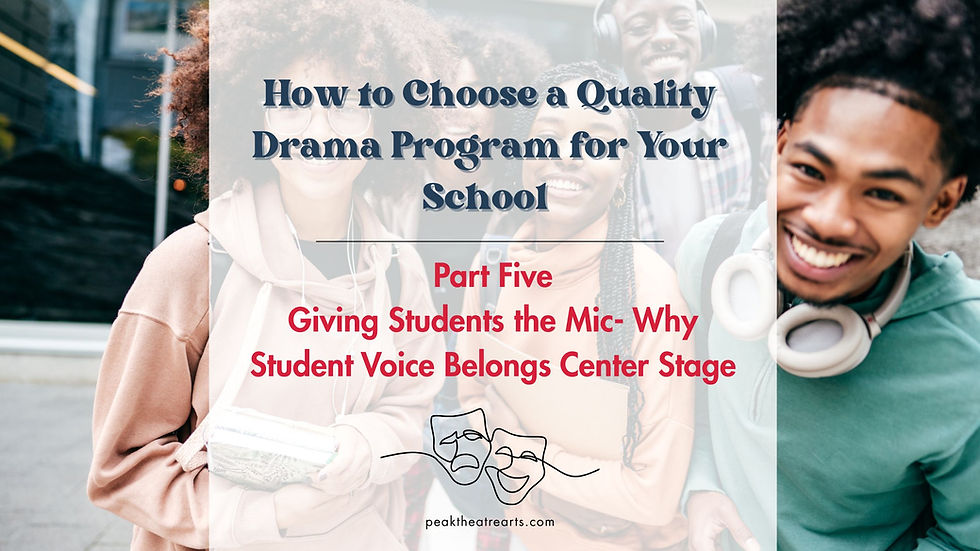Giving Students the Mic—Why Student Voice Belongs Center Stage
- Ms. A

- Jul 31, 2025
- 5 min read
Updated: Dec 6, 2025
A 7-Part Series on How to Choose a Quality Drama Program for Your School

Want to choose the right drama program?
Grab The Spotlight Checklist™ — your quick guide to reviewing vendors, aligning programs with district goals, and ensuring students learn in joyful, culturally sustaining spaces.
Giving Students the Mic-- Why Student Voice Belongs Center Stage
Table of Contents:
What is Student-Led Creation?
Student-led creation is exactly what it sounds like: a collaborative process where students have real input and influence over the stories being told, the characters being developed, and the way a performance takes shape.
This doesn’t mean chaos or throwing out structure. It means building a process where students co-create the work alongside teaching artists, generating ideas, making artistic choices, and taking risks in a safe, supported environment.
Why does it matter in Expanded Learning?
It’s easy to underestimate young people, but when given the opportunity to lead, they continuously rise to the challenge. We assume they need to be told what to do, rather than invited to discover what they want to say. When we give students the mic, literally and figuratively, they begin to see themselves as artists, leaders, and change-makers.
Students learn how to:
Develop agency. Student-led creation helps young people trust their instincts and their ideas.
Build confidence. Sharing their voice and seeing it valued on stage empowers students to speak up in other areas of life.
Strengthen collaboration skills. Working together to tell a story fosters listening, compromise, and creative problem-solving.
Experience belonging. Students see themselves, their cultures, their humor, and their truths reflected in the work.
What does the Research say
Research supports what teaching artists already see: when young people are invited into meaningful creative roles, such as devising their theatre, attention and motivation deepen, and empowerment follows.
Studies highlight that devised or student-created theatre fosters students’ sense of agency, belonging, and identity formation. For example, Perry (2011) in Youth Theatre Journal emphasizes how participation in making theatre collaborative helps adolescents develop a stronger sense of self and collective voice.
Furthermore, research published in Arts Education Policy Review shows that student-led arts practices play a powerful role in supporting Social-Emotional Learning (SEL).
In these environments, students don’t just learn artistic skills; they learn how to express their emotions, build meaningful relationships, and reflect on their lives and communities through storytelling and creative exploration.
This isn’t just theory it’s backed by research and lived out in real classrooms every day.
1. On student-devised theatre fostering agency, belonging, and identity formation:
Perry, M. (2011). Theatre and knowing: Considering the pedagogical spaces in devised theatre. Youth Theatre Journal, 25(1), 63–74. https://doi.org/10.1080/08929092.2011.569476
2. On student-led arts practices enhancing social-emotional learning:
Anderson, A. (2020). Arts and social-emotional learning: The power of student voice. Arts Education Policy Review, 121(3), 123–132. https://doi.org/10.1080/10632913.2020.1777494

What does it look like at Peak Theatre Arts?
At Peak, student-led creation isn’t just a teaching strategy—it’s a core value. We don’t just hand students a script; we help them write one. Our teaching artists are trained in devising methods, creative facilitation, and youth development practices that empower students to write their stories.
One example of this approach is when we brought our Spotlight residency to students at Dalzell Lance High School, in partnership with the Children's Institute. Throughout a 16-week residency, students were guided through the full creative process developing, writing, and performing an original one-act play.
The result? A high-stakes, dystopian thriller, Escape Room: The Battle for Tomorrow.
The Synopsis:
Welcome to the Year 2050, Where Survival Is the Ultimate Test.
In a world teetering on the edge of collapse, four teenagers are thrust into a deadly escape room—forced to solve puzzles, confront injustice, and make impossible choices just to stay alive. As they fight tooth and nail for survival, they wrestle with betrayal, loss, and identity, all while deciding who—and what—they’re willing to fight for.
Friendships are tested.
Alliances are fleeting.
Only some will make it out.
A bold, emotional journey through the heart of what it means to resist, to remember, and to rise above injustice.
I know, right?! This could totally be a movie.
At Peak, we believe that when students are given the tools, support, and freedom to create, their brilliance shines. Whether they’re telling their story or imagining a world where they’re the heroes or villains, creative genius flourishes when young people are trusted with the mic.
Escape Room: The Battle for Tomorrow isn’t just a play. It’s proof that students don’t just have something to say, they have stories worth centering, celebrating, and sharing with the world.
So, how did we do it? Peep the process.
.
The Process: From Blank Page to Full Stage
Our work with Dalzell Lance began with a clear, intentional framework that centered student voice every step of the way:
Creative Brainstorming: Students explored big ideas they cared about—survival, justice, grief, revenge, and hope. These themes became the emotional backbone of the story.
Character Building: Each student developed a character based on values, wounds, strengths, and secrets, grounding the play in authentic emotional stakes.
World-Building & Plot Structure: Together, students imagined a dystopian future set in the year 2050, designing the rules of a deadly escape room and weaving in bold political commentary inspired by the injustices, tensions, and power dynamics they see today.
Collaborative Writing: Scenes were drafted through improvisation, group writing sessions, and peer feedback. Students worked in writing pods, shared work aloud, and edited collaboratively—with PEAK teaching artists serving as guides, not directors.
Rehearsal & Performance: Students rehearsed their own words, brought their characters to life, and performed their original work for a live audience. It wasn’t just performance—it was ownership, visibility, and transformation.
They made the rules.
They asked the hard questions.
They wrote themselves into the narrative.
From concept to curtain call, they were the authors, the artists, and the visionaries.
Escape Room: The Battle for Tomorrow Showcase Photos
What to Ask When Choosing a Drama Program?
If you're an educator, school leader, or parent looking for a program that centers student voice, here are some questions to consider:
How are students involved in creating or shaping the performance material?
Do teaching artists use devised theatre, improvisation, or student-driven storytelling methods?
Are students encouraged to express their own experiences, ideas, and identities?
How are creative decisions made, and who gets to make them?
Is the program flexible enough to follow student interest, energy, and voice?
Coming Up in Part Six- Process over Product
Final performances can be powerful moments of celebration, but they’re not the only thing that matters.
In Part Six, we’ll explore why the process is where the real magic happens. When we shift our focus from polished perfection to creative exploration, we create space for something much deeper: learning, risk-taking, collaboration, and growth.
This is where artistic excellence is nurtured, not demanded. Where young people feel safe enough to try, to fail, and to try again. Where every step, every brainstorm, every revision, every rehearsal is seen as valuable and vital.
We’ll dive into how process builds resilient, reflective, and creative learners, and how this approach leads to more joyful experiences and stronger, more connected communities.
Because at Peak, we believe the journey is the destination.
Grab The Spotlight Checklist™
A simple, powerful tool I created to help you clearly identify programs that honor students’ brilliance, support their growth, and align with your school or district goals.
Inside the checklist, you’ll find what to look for when:
Reviewing or selecting enrichment vendors
Advocating for arts funding or expanded arts access
Aligning programs with district initiatives and quality standards
Setting expectations with teaching artists and partners
Strong drama programs don’t just fill time — they create joyful spaces where imagination, culture, and community come alive.
Download The Spotlight Checklist™ and choose programs that truly serve your students.



































Comments